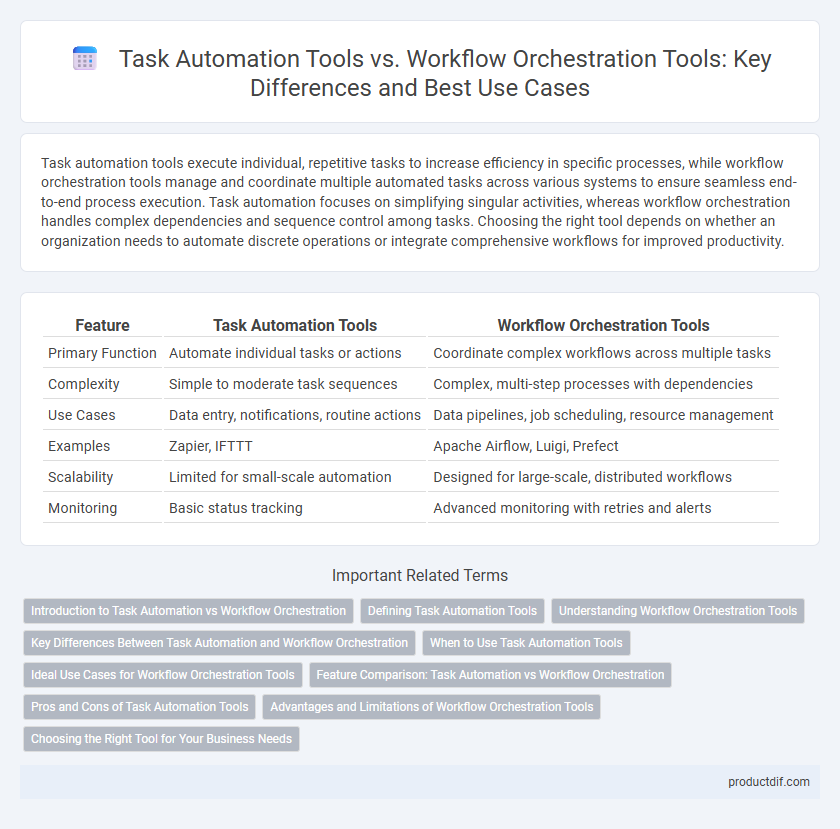Task automation tools execute individual, repetitive tasks to increase efficiency in specific processes, while workflow orchestration tools manage and coordinate multiple automated tasks across various systems to ensure seamless end-to-end process execution. Task automation focuses on simplifying singular activities, whereas workflow orchestration handles complex dependencies and sequence control among tasks. Choosing the right tool depends on whether an organization needs to automate discrete operations or integrate comprehensive workflows for improved productivity.
Table of Comparison
| Feature | Task Automation Tools | Workflow Orchestration Tools |
|---|---|---|
| Primary Function | Automate individual tasks or actions | Coordinate complex workflows across multiple tasks |
| Complexity | Simple to moderate task sequences | Complex, multi-step processes with dependencies |
| Use Cases | Data entry, notifications, routine actions | Data pipelines, job scheduling, resource management |
| Examples | Zapier, IFTTT | Apache Airflow, Luigi, Prefect |
| Scalability | Limited for small-scale automation | Designed for large-scale, distributed workflows |
| Monitoring | Basic status tracking | Advanced monitoring with retries and alerts |
Introduction to Task Automation vs Workflow Orchestration
Task automation tools streamline repetitive, individual tasks by automating specific actions within a process, significantly enhancing efficiency and reducing manual effort. Workflow orchestration tools coordinate and manage multiple automated tasks across complex processes, ensuring seamless integration and execution order to achieve broader business objectives. Understanding the distinction helps organizations select solutions that either optimize discrete tasks or oversee entire workflows for end-to-end process management.
Defining Task Automation Tools
Task automation tools enable the execution of repetitive, predefined tasks without human intervention, streamlining specific operations such as data entry, file transfers, and report generation. These tools focus on automating individual actions through scripts or software bots to improve efficiency and reduce errors. Unlike workflow orchestration tools, task automation tools are designed for isolated tasks rather than managing complex, multi-step processes across systems.
Understanding Workflow Orchestration Tools
Workflow orcheschestration tools coordinate and manage multiple automated tasks across diverse systems to ensure seamless execution of complex business processes. They enable real-time monitoring, error handling, and dependency management, offering enhanced visibility and control compared to basic task automation tools. Leading platforms like Apache Airflow, Prefect, and Argo Workflows provide scalable solutions for data pipelines, cloud deployments, and multi-stage job coordination.
Key Differences Between Task Automation and Workflow Orchestration
Task automation tools focus on automating individual, repetitive tasks to increase efficiency, while workflow orchestration tools coordinate multiple automated tasks into a seamless end-to-end process. Task automation emphasizes rule-based execution of discrete actions, whereas workflow orchestration involves managing dependencies, decision logic, and error handling across complex workflows. Key differences include scope of automation, capability to handle inter-task communication, and integration with broader enterprise systems.
When to Use Task Automation Tools
Task automation tools are ideal for streamlining repetitive, individual tasks such as data entry, file transfers, and simple scripting processes to increase efficiency and reduce human error. These tools excel in scenarios where isolated actions need to be executed quickly and consistently without the need for complex dependencies or conditional logic. Implementing task automation is beneficial in environments that require quick deployment and minimal integration with other systems.
Ideal Use Cases for Workflow Orchestration Tools
Workflow orcheschestration tools excel in managing complex sequences of interdependent tasks across multiple systems, making them ideal for large-scale data pipelines, multi-cloud environments, and enterprise-grade application workflows. These tools provide centralized control, error handling, and monitoring capabilities, ensuring reliable execution and seamless integration of diverse automated processes. Their ability to coordinate tasks with dependencies and dynamically adjust workflows positions them as essential in scenarios requiring intricate operational coordination and real-time process optimization.
Feature Comparison: Task Automation vs Workflow Orchestration
Task automation tools focus on executing individual, repetitive tasks with precision and speed, often integrating with specific applications or APIs to streamline simple actions. Workflow orchestration tools provide a higher-level capability by managing complex sequences of interconnected tasks, enabling conditional logic, parallel execution, and monitoring across diverse systems. Feature comparisons highlight that task automation emphasizes task-specific triggers and actions, while workflow orchestration supports end-to-end process management, error handling, and dynamic resource allocation.
Pros and Cons of Task Automation Tools
Task automation tools excel in simplifying repetitive tasks, boosting efficiency by reducing manual input and errors, but they often lack the flexibility to manage complex, multi-step processes across diverse systems. Their user-friendly interfaces enable quick implementation and minimal technical expertise, though scalability can become an issue when workflows grow in complexity. These tools are ideal for automating isolated tasks but may require integration with workflow orchestration platforms to handle end-to-end business processes effectively.
Advantages and Limitations of Workflow Orchestration Tools
Workflow orchestration tools offer the advantage of coordinating complex, multi-step processes across diverse systems, enhancing visibility and reducing manual intervention, which leads to improved efficiency and error reduction. However, these tools can be limited by their dependency on predefined workflows, making them less flexible in handling ad-hoc or dynamic tasks compared to task automation tools. Scalability challenges and the need for specialized knowledge to design and maintain workflows can also impact their adoption and effectiveness in rapidly changing environments.
Choosing the Right Tool for Your Business Needs
Task automation tools streamline repetitive, individual tasks by automating specific actions within a business process, enhancing efficiency at the micro-level. Workflow orchestration tools manage complex, multi-step processes by coordinating multiple automated tasks and systems, ensuring seamless integration and end-to-end process control. Selecting the right tool depends on your business needs: choose task automation for simple, repetitive tasks and workflow orchestration for comprehensive process management across departments and systems.
Task automation tools vs Workflow orchestration tools Infographic

 productdif.com
productdif.com